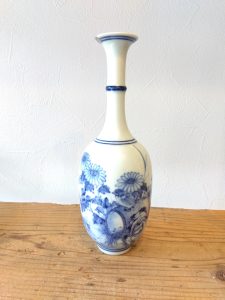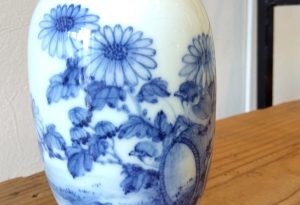もしかしたら何か見つかるかもしれません(愛知県名古屋市千種区姫池通 骨董買取 古美術風光舎)
2024.05.24
みなさまこんにちは、スタッフTでございます。
今日は薄雲がありますが、晴天の名古屋です。手荷物が増えるのが面倒だなと思いましたが、日傘を引っ張り出しました。いよいよ、また暑い日々がやってくるのかと恐れおののいています。
とはいえ、酷暑が予想される夏の前に、じめじめの梅雨がやってまいりますので、お片付けなどには今の時期を逃す手はありません。

そういえばしばらく前に、藤原定家自筆の古今和歌集の注釈書が発見され話題になりましたね。
平安末期~鎌倉期の歌人、藤原定家が記した古今和歌集の注釈書『顕注密勘(けんちゅうみっかん)』の自筆原本が、初めて見つかりました。
定家の流れをくむ冷泉家で代々継承された『古今伝授』の箱から見つかったもので、蔵でひっそりと守られ、冷泉家秘伝の箱に約130年もの間開封されなかったそうです。調査した専門家が「国宝や重要文化財級は出尽くしたと思っていた」というほどの驚きの発見だったようです。
冷泉家は宮中で歌会開催などを代々担ってきた「和歌の家」で、貴重な書物などが多く残ることから、「文書の正倉院」とも呼ばれます。『古今伝授』は歴代当主が一生に一度だけ開けて、歌学の修練に励んだものだそうで、最後の開封記録は明治29年。約130年開封されなかった理由は不明だそうですが、今回の調査のために、和歌の神々と先祖への許しを請う神事を行ったそうです。
藤原定家は新古今和歌集の選者として知られていますが、私のように古今和歌集と新古今和歌集の違いは何だっけ?と思った方はいらっしゃいましたか?
中学高校時代に習った内容を思い出しても、さっぱりなので調べたところ、まず有名な和歌集としては「万葉集」「古今和歌集」「新古今和歌集」があります。
そうでした・・・思い出してきました。
はじめに、「万葉集」は現存する日本最古の和歌集で、撰者ははっきりとしていませんが、大伴家持がかかわったとされています。天皇や貴族だけでなく、庶民が詠んだものまであり、およそ四千五百首の歌が収められています。
ご存知かと思いますが、元号の「令和」は万葉集の一首が由来となっています。
次に、「古今和歌集」は平安時代前期の日本最初の勅撰和歌集(ちょくせんわかしゅう)です。勅撰和歌集とは、天皇や上皇の命によって編集された和歌集のことを指します。醍醐天皇(だいごてんのう)の命令で、紀貫之(きのつらゆき)らが編集しました。約1100首が集められ、その4割ほどが詠み人知らずで、選者の歌が2割以上を占めており、繊細で優美な歌が多く、女性的ともいわれています。
最後に、「新古今和歌集」は鎌倉時代に後鳥羽上皇の命により編集された勅撰和歌集です。藤原定家をはじめ6人の選者によって、万葉集やそれまでの勅撰和歌集に選ばれなかった和歌の中から、約2000首が集められています。
今回見つかった『顕注密勘』は、歌学者・顕昭による古今和歌集の注釈に対して、藤原定家が自説を付け加えたものだそう。これまで写本しかなかったため、解釈が顕昭・定家どちらのものか曖昧だった部分が、顕昭への反論に紙を付け足すなどされており、区別がより明確になったようです。藤原定家の思考を知る手がかりとなるようですね。
このような世紀の発見とはいかなくても、ご実家の倉庫や蔵に、もしかしたらたくさんの骨董品が眠っているかもしれません。遺品整理の際に見つけた数々の工芸品がもしかしたら、価値があるものだったなんてことも。一気に着手するのは大変ですので、まずは手つかずの場所の風通しから始めてみてはいかがでしょうか。何か見つかるかもしれませんよ。
ではでは、また。

Hello everyone, this is Staff T.
It is a sunny day in Nagoya today, although there are some light clouds. I pulled out my parasol, though I thought it would be a hassle to carry more baggage. I am afraid that hot days are finally coming again.
However, the rainy season is coming before the summer, which is expected to be extremely hot, so there is no way to miss this time of year for cleaning up.
By the way, a while ago, a commentary on the Kokin Waka Shu (Anthology of Ancient and Modern Japanese Poetry) in Fujiwara Teika’s own hand was discovered and became a topic of conversation.
For the first time, the original manuscript of “Kenchu Migikan,” a commentary on the Kokin Waka Shu written by Fujiwara no Teika, a poet from the late Heian to Kamakura periods, has been found.
It was found in a box of “Kokin Denju,” which had been handed down from generation to generation in the Reizei family, the descendants of Teika. The box was kept quietly in a storehouse and was not opened for about 130 years in the Reizei family’s secret box. The discovery was such a surprise that the expert who investigated it said, “I thought we had run out of national treasures and important cultural properties.
The Reizei family is said to be called the “Shosoin of Documents” because of the large number of valuable books and documents that remain in the house. The “Kokin Denju” is said to have been opened only once in the lifetime of each successive head of the family to train in the study of waka poetry, and the last record of its opening was in 1896. The reason why it was not opened for about 130 years is unknown. For this research, they held a Shinto ritual to ask for forgiveness to the gods of waka poetry and their ancestors.
Fujiwara no Teika is known as the selector of the Shinkokin Wakashu, but what is the difference between the Kokin Wakashu and the Shinkokin Wakashu, like me? Did anyone else wonder, like me, what the difference is between the Kokin Wakashu and the Shin Kokin Wakashu?
I had no idea, even though I remembered what I learned in junior high and high school, so I looked it up. The first famous waka anthologies are the Manyoshu, Kokin Wakashu, and Shin Kokin Wakashu.
That’s right… I started to remember.
First of all, “Manyoshu” is the oldest extant collection of waka poetry in Japan, and although the author is not known for certain, Otomo no Iemochi is believed to have been involved with it. It contains approximately 4,500 poems, not only by emperors and aristocrats, but also by ordinary people.
As you may know, the Japanese era name “2025” is derived from one of the poems in the Manyoshu.
The Kokin Wakashu is Japan’s first imperial collection of waka poems dating back to the early Heian period. The imperial anthology refers to a collection of waka poems compiled by order of an emperor or superior. The collection was compiled by Kino Tsurayuki and others at the order of Emperor Daigo. About 1,100 poems were collected, about 40% of which are unknown to the poet, and more than 20% of the poems are by the selectors. Many of the poems are delicate and graceful, and are said to be feminine.
Finally, the “Shinkokin Wakashu” is an imperial collection of waka poems compiled in the Kamakura period by order of the Emperor Go-Toba. It was compiled by six selectors, including Fujiwara no Sadaie, and contains approximately 2,000 waka poems that were not selected for inclusion in the Manyoshu or previous imperial anthologies.
The “Kenshu Mikikan” found in this collection is said to be a commentary on the Kokin Waka Shu by the poet Kensho, to which Fujiwara no Teika added his own theory. Since only manuscripts had been available until now, the interpretation was ambiguous as to whether it belonged to Kensho or Teika, but now the distinction seems to be clearer, as a paper has been added to refute Kensho. It seems to provide a clue to the thinking of Fujiwara no Teika.
Even if you don’t find the find of the century, you may still find many antiques in your family’s warehouse or storehouse. It is also possible that many of the artifacts you find when sorting through your belongings may turn out to be of great value. It is difficult to start all at once, so why not start by ventilating the untouched places? You might find something.
See you soon.
*******************
ご実家の整理やお片付けなどをされている方のご相談などが多くございます。
お片付けなどくれぐれもご無理のないようになさってくださいませ。
風光舎では古美術品や骨董品の他にも絵画や宝石、趣味のお品など様々なジャンルのものを買受しております。
お片付けをされていて、こういうものでもいいのかしらと迷われているものでも、どうぞお気軽にご相談下さいませ。
また風光舎は、出張買取も強化しております。ご近所はもちろん、愛知県内、岐阜県、三重県その他の県へも出張いたします。
まずは、お電話お待ちしております。
愛知県名古屋市千種区姫池通
骨董 買取【古美術 風光舎 名古屋店】
TEL052(734)8444
10:00-18:00 OPEN

